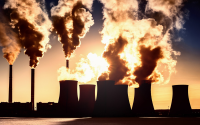21 November 2007Rachel Oliver
On first glance, the global food supply appears to have little to do with climate change. A potentially looming food crisis that the world is being warned about has not been directly created by car exhaust fumes or factories billowing smoke into the atmosphere, after all.
But as it turns out, the food chain has been responsible for significant growths in carbon dioxide (CO2) levels in the atmosphere over time, forcing us to re-evaluate how we grow and transport our food in light of shrinking land availability, a growing world population, dire water shortages, mass animal and plant extinctions -- not to mention the quest for new sources of energy.
It turns out that how we eat is affecting climate change -- and climate change is affecting how we eat.
According to the UK's Soil Association, 50 percent of the increase in global CO2 emissions between 1850 and 1990 has been tied to changes in land use --mainly because of farming practices.
Today, the Food Climate Research Network (FCRN) estimates that as much as 31 percent of the EU's greenhouse gas emissions come from the food chain. More than half of that amount -- 18 percent of total emissions -- comes from meat production, leading to growing calls for people to cut back on their meat consumption, or to eliminate meat from their diets completely. (The "average burger man...emits the equivalent of 1.5 tons more CO2 every year than the standard vegan," reports The Guardian, for example).
The other main contributor to food-related emissions is how the food gets to us in the first place. According to Farmers Weekly, the amount of food that is air-freighted around the world has increased by 140 percent since 1990. The UK, for example, now imports more food than it exports, with 95 percent of its fruit and 50 percent of its vegetables coming from overseas. It is generally accepted that the global transportation sector contributes 14 percent of greenhouse gas emissions.
Rising fuel costs driven by concerns over diminishing fossil fuel supplies will only make matters worse, particularly in terms of driving up prices. As the head of the FAO said recently: "If you combine the increase of the oil prices and the increase of food prices then you have the elements of a very serious [social] crisis in the future," The Guardian reports.
This has led to the discussion of "food miles," the logic being that eating local food is better for the environment than food that has traveled thousands of miles to get to our plates. Up until recently, however, talk over food miles has been taken with a proverbial pinch of salt, as 90 percent of global trade -- including the global distribution of food - is served by the shipping industry. And up until recently it was believed that shipping was more environmentally friendly than aviation.
It now looks like we could have been wrong about that. A recent report released by the International Maritime Organization, or Intertanko, has revealed that contrary to previous data, the shipping industry globally emits twice as much greenhouse gases -- 1.2 billion tons -- as the aviation industry, which emits between 600 and 650 million tons annually. The idea of growing food locally suddenly seems to make more sense.
Can nations 'grow local'?
Locally grown food also becomes more compelling when you look at the state of some of the world's food-producing countries which the rest of the world relies on for key produce. Quoting the recent "Asia-Up in Smoke" report, The Bangkok Post points out that by the end of this century, climate change-induced floods and droughts could cost India 30 percent of its total food production; and China 37 percent of its wheat, rice and corn crops.
Meanwhile, the recent Stern Review on the Economics of Climate Change states that "declining crop yields ... could leave hundreds of millions without the ability to produce or purchase sufficient food", reports The Food Magazine.
As the world's human population grows, so will the problem of the global food supply. Whichever way you look at it, the more of us there are, the less food there is to eat, certainly using current farming practices anyway. ![]() Watch one expert advocate the use of vertical farming »
Watch one expert advocate the use of vertical farming »
Even today, the United Nations says that the human population is so big that "the amount of resources needed to sustain it exceeds what is available," reports AFP. The FAO warns that around 30 percent of livestock are "close to extinction"; with around 75 percent of the "genetic diversity of agricultural crops" having already disappeared.
But in 50 years' time there will be another 3 billion of us to feed, the general consensus settling around the 9.5 billion mark. To feed those extra people would take farmland the size of Brazil, the argument goes.
The problem is, the amount of arable land per person is shrinking, says the FAO, from 0.38 hectares in 1970 to 0.23 in 2000, to 0.15 in 2050. And while the FAO admits that some developing countries will be able to expand their arable land by as much as 12 percent, the downside is that a "considerable part" of this extra farmland will be a direct result of deforestation.
Meanwhile, the arable land that we do currently have is becoming more damaged, with soil erosion now causing 40 percent of land degradation worldwide, the FAO says. Another 20 percent of irrigated land is damaged by water logging or salinity, the agency says.
Supply of water, fuels for growing food a challenge
Which brings us to the issue of water. Water is vital to food production, but we are told it will be in such scarce supply that it will bring about "water wars" between nations. The Intergovernmental Panel on Climate Change (IPCC) says that by 2080 a heart-stopping 3.2 billion people will suffer water shortages.
Current agricultural methods employed globally exacerbate the issue of our water supply to a breathtaking degree. In most parts of the world, up to 80 percent of drinkable water is used for agriculture. In parts of Africa and Asia, it's more than that. It's not much surprise then that crop yields in both continents "could halve by 2020", reports the Sunday Times.
Conversely the melting of glaciers is making this situation worse, reports AP, as they "have contributed to a decline in runoff to countries that depend on them for drinking water and irrigation".
Talk of biofuels doesn't help matters. According to the Soil Association, the OECD believes that if the EU were to replace just 10 percent of its fuel needs with biofuel, it would require 72 percent of its arable land. The impact on the food supply couldn't be more obvious should that happen. (As Worldwatch Institute founder Lester Brown told the Guardian recently: "The competition for grain between the world's 800 million motorists, who want to maintain their mobility, and its 2 billion poorest people, who are simply trying to survive, is emerging as an epic issue.")
However, despite the evident moral issues of sacrificing food crops for fuel crops, economic concerns are driving people and nations to do exactly that.
The head of the World Food Programme (WFP) has revealed that poor African farmers are now opting to sell crops like cassava for use as alternative energy instead of food -- because they get paid more for it, reports Reuters. The WFP also says that China, one of the world's leading corn exporters, withheld stocks last year for the purpose of biofuels, Reuters says.
From an economic perspective, poor African nations selling their food to fuel-hungry rich countries makes perfect sense as poor countries rely heavily on rich nations for their income. African nations are thus naturally reluctant to embrace the "locally grown" movement that is being pushed by developed nations. The reason is obvious: Cutting off imports from developing nations in a bid to combat climate change could have devastating affects on the world's poorest. And this makes tackling the problems of the global food supply even more difficult.
"At what cost to global justice do we shut the door on the economic prospects of small farmers in Africa by refusing to buy their produce," Ghana's High Commissioner to Britain recently asked at a meeting to discuss global warming's affect on Africa, according to Reuters.
http://edition.cnn.com/2007/BUSINESS/11/21/eco.food/index.html?section=cnn_latest






